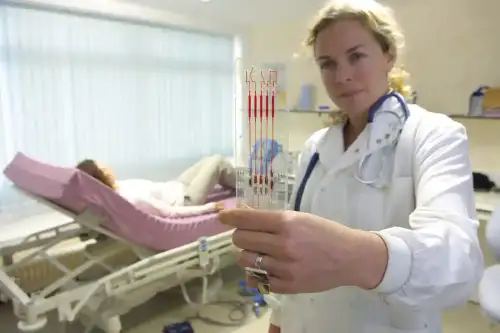
Celiac.com 11/07/2024 - Celiac disease is an immune-mediated disorder triggered by the ingestion of gluten in genetically predisposed individuals. One of the key factors in determining this genetic predisposition is the presence of specific alleles that code for the DQ2 and DQ8 heterodimers. These heterodimers are encoded by the HLA-DQA and HLA-DQB genes, with the HLA-DQB1*02 allele being one of the most strongly associated with celiac disease.
While both genetic predisposition and gluten exposure are necessary to develop celiac disease, they are not sufficient on their own. This means that not all individuals with these genetic markers will develop the disease, but those without them are highly unlikely to do so. Despite the well-established genetic and environmental factors, celiac disease remains underdiagnosed, especially in individuals presenting mild or atypical symptoms. This study sought to explore the frequency of the HLA-DQB1*02 allele among celiac patients, as a means to evaluate whether genetic testing could be used as a cost-effective first-line screening tool.
Study Objective and Methodology
Celiac.com Sponsor (A12):
The primary aim of this study was to assess the carrier frequency of the HLA-DQB102 allele among individuals diagnosed with celiac disease. To achieve this, a systematic review was conducted, analyzing data from 38 studies that reported on the HLA-DQB1 genotype of 4,945 celiac patients. The studies were selected from major medical databases, including PubMed, EMBASE, Cochrane, Web of Science, and Scopus, and the results were carefully analyzed to determine the prevalence of the HLA-DQB102 allele among celiac patients.
The study followed the PRISMA guidelines for systematic reviews, ensuring that the data was collected and analyzed in a rigorous manner. The focus was on identifying how frequently celiac patients carried at least one copy of the HLA-DQB1*02 allele and to evaluate whether this could be used as a reliable marker for early screening, particularly in cases where serological testing might be less effective.
Key Findings: HLA-DQB1*02 Frequency in Celiac Patients
The results of the systematic review revealed that 94.94% of celiac patients carried at least one copy of the HLA-DQB1*02 allele. This means that only 5.06% of the celiac population lacked this genetic marker entirely. Interestingly, when focusing on studies where the prevalence of celiac patients with type 1 diabetes was low, the percentage of non-carriers dropped even further to 3.65%.
This high prevalence of the HLA-DQB102 allele among celiac patients highlights its strong association with the disease. For individuals without other risk factors, such as type 1 diabetes, the likelihood of developing celiac disease without carrying this allele is extremely low. This raises the possibility that a genetic test for the HLA-DQB102 allele could be used as an initial screening tool to identify individuals at risk of celiac disease.
Implications for Screening: A Cost-Effective Approach
Given the high carrier frequency of the HLA-DQB1*02 allele, the study suggests that genetic testing for this marker could be an effective first-line screening method for celiac disease. If implemented, this approach could significantly reduce the need for widespread serological testing, particularly in individuals who are not genetically predisposed to the disease.
A targeted genetic test for the HLA-DQB1*02 allele would be relatively low-cost and could help identify individuals who are more likely to benefit from further testing and monitoring. For example, those who test positive for the allele could then undergo serological testing to confirm the presence of celiac disease, while those who test negative could avoid unnecessary testing.
This approach could be particularly useful in pediatric populations, where early diagnosis is crucial to prevent long-term complications associated with undiagnosed celiac disease. By focusing on individuals who carry the HLA-DQB1*02 allele, healthcare systems could streamline the screening process, making it more efficient and cost-effective.
The Role of HLA-DQ Genotyping in Diagnosis
In cases where traditional diagnostic methods, such as serological testing and biopsy, are inconclusive, HLA-DQ genotyping can play a critical role in determining whether a patient is genetically predisposed to celiac disease. This is especially important in complex clinical cases where the presence of other conditions, such as immunoglobulin A deficiency, can affect the accuracy of serological tests.
While HLA-DQ genotyping is not typically used as a routine diagnostic tool due to its cost, the findings of this study suggest that testing for the HLA-DQB1*02 allele specifically could offer a cost-effective alternative. By identifying individuals who are genetically predisposed to celiac disease, this approach could help optimize the use of serological tests and reduce the likelihood of false negatives in complex cases.
Why This Study Matters for Celiac Disease Patients
For individuals with or at risk for celiac disease, the findings of this study could have important implications for how the disease is diagnosed and managed. The high frequency of the HLA-DQB1*02 allele among celiac patients suggests that genetic testing could become a valuable tool for early screening, particularly in populations that are underdiagnosed or have limited access to healthcare.
By identifying individuals who are genetically predisposed to celiac disease, healthcare providers can offer more targeted and timely interventions, reducing the burden of undiagnosed celiac disease. Early diagnosis and treatment are crucial for preventing the long-term complications associated with the disease, such as malnutrition, anemia, and increased risk of certain cancers.
For the growing population of individuals following a gluten-free diet, many of whom may be undiagnosed celiac patients, this study offers hope for a more efficient and accurate screening process. With the potential for a cost-effective genetic test, more individuals could be identified early, leading to better outcomes and improved quality of life for those living with celiac disease.
Moving Towards a Targeted Screening Approach
The findings of this study underscore the potential for using HLA-DQB1*02 allele testing as a first-line screening tool for celiac disease. With a carrier frequency of over 95% among celiac patients, this genetic marker offers a highly reliable way to identify individuals at risk of developing the disease. By implementing a targeted genetic testing approach, healthcare providers could reduce the need for widespread serological testing and offer a more efficient and cost-effective way to diagnose celiac disease.
For individuals with celiac disease, early diagnosis is key to managing the condition and preventing long-term health issues. This study provides valuable insights into how genetic testing could play a pivotal role in improving the diagnosis and management of celiac disease in the future.
Read more at: ncbi.nlm.nih.gov








.thumb.jpg.d8ccdbb71dd5d276bacf435aa9f4427d.jpg)

Recommended Comments
There are no comments to display.
Create an account or sign in to comment
You need to be a member in order to leave a comment
Create an account
Sign up for a new account in our community. It's easy!
Register a new accountSign in
Already have an account? Sign in here.
Sign In Now